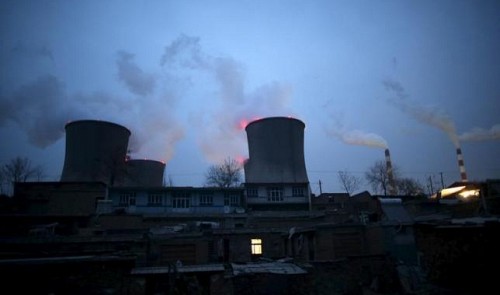China’s fuel-fired power plants cause air pollution in northern Vietnam: study

Scientists under the Vietnam Institute of Meteorology, Hydrology and Climate Change (IMH) have found that 40 to 50 percent of the levels of common air pollutants in northern Vietnam “come from outside the country” via the north and northeastern borders.
The level of sulfur dioxide (SO2), one of the most dangerous air pollutants, that originates from China could be as high as 52 percent, the institute said in a report recently submitted to the Ministry of Natural Resources and Environment, citing findings from its cross-border air pollution research.
The respective levels of nitrogen dioxide (NO2) and carbon monoxide (CO) in the air in northern Vietnam that have their root in China are 48 percent and 30 percent, according to the report.
“The study’s findings show that cross-border air pollution exists in northern Vietnam,” the IMH said.
SO2 is a gas primarily emitted from fossil fuel combustion at power plants and other industrial facilities.
NO2 pollutes the air mainly as a result of road traffic and energy production, and CO is emitted from vehicles.
Air pollution spreads from China to northern Vietnam during the period between October and December thanks to the northeast monsoon, according to the report.
Vietnam and China share more than 1,300km of border lines, with seven Vietnamese border provinces including Dien Bien, Lai Chau, Lao Cai, Ha Giang, Cao Bang, Lang Son and Quang Ninh.
Scientists conducted air quality monitoring, remote sensing analysis and a math model application to carry out the research, according to the IMH.
In summertime, the levels of SO2, NO2 and CO in the air originating from China in northern Vietnam are only four percent, two percent and 1.5 percent, respectively, as the northeast monsoon is weaker then than it is in winter.
The IMH report focuses solely on analyzing the SO2 level in the air, as there are many fuel-fired power plants in southern China, according to the institutes’ deputy head, Prof. Dr. Duong Hong Son.
“SO2 and NO emissions are the cause of acid rain, which can destroy agricultural crops and production,” Son said.
The academic said the IMH research should be followed by more in-depth studies on cross-border air pollution to gain enough information to propose solutions at a macro level to the issue.
Newer articles
Older articles
